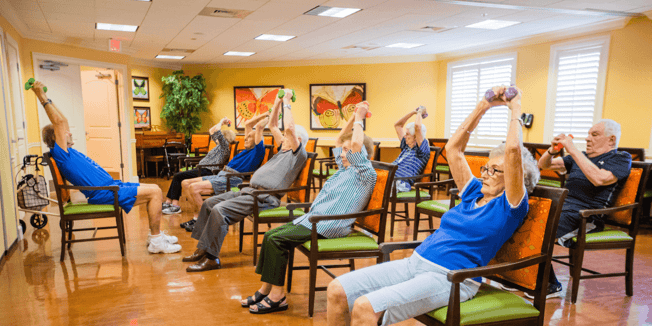The Significance of a Comprehensive Program of Care in Assisted Living Setups
In aided living settings, the implementation of a comprehensive program of treatment is vital for addressing the complex demands of citizens. Such programs not just incorporate medical and emotional services but additionally foster social interaction, which is crucial for boosting general well-being. By focusing on personalized treatment plans and entailing households in the process, these programs can considerably improve health outcomes and quality of life. However, the inquiry remains: what details techniques can be used to guarantee that these programs are successfully tailored to satisfy the distinct demands of each local?
Recognizing Comprehensive Care Programs
As helped living facilities proceed to develop, understanding extensive care programs ends up being essential for both homeowners and their households. Comprehensive treatment programs are designed to deal with a large range of needs for individuals residing in helped living settings, ensuring that each resident receives customized assistance that mirrors their distinct health conditions and lifestyle choices.

Furthermore, extensive care programs emphasize control among various service providers, making sure seamless communication in between caregivers, medical personnel, and family participants. This integrated approach not just boosts the top quality of care yet likewise fosters a supportive community setting. Households play an essential role in this procedure, getting involved in care planning and recurring discussions to ensure that the resident's demands are constantly fulfilled. Comprehending these programs is vital for making notified decisions regarding care choices and maximizing the quality of life for homeowners in assisted living centers.
Advantages for Locals

(Memory Care Facility Charlotte)One primary benefit of comprehensive care is the enhancement in health and wellness outcomes. Regular surveillance and coordinated medical treatment help in the early discovery and monitoring of persistent problems, minimizing hospital stays and emergency interventions. In addition, locals gain from boosted social involvement, as organized tasks and programs cultivate a sense of area, combatting feelings of isolation and solitude.
In addition, locals experience enhanced assurance, recognizing that expert support is conveniently offered must they need aid. This assurance enables them to concentrate on appreciating their daily tasks and preserving meaningful partnerships.
Role of Caregivers
Caretakers play an essential duty in the wellness of residents in assisted living centers, making sure that their needs are met concern and expertise. They function as the main factor of get in touch with for locals, providing essential assistance in everyday activities such as showering, dressing, and medicine monitoring. Their existence not only advertises physical wellness however also boosts emotional and social wellness by cultivating relationships improved depend on and understanding.
In enhancement to supporting daily living jobs, caregivers contribute in checking changes in citizens' wellness and behavior. They are trained to recognize refined signs of distress or decrease, enabling prompt interventions that can avoid difficulties. Their expertise of each citizen's one-of-a-kind history and choices permits them to supply personalized care, improving the general lifestyle.
Additionally, caretakers serve as supporters for locals, connecting their needs and choices to various other medical care specialists and relative. This campaigning for is crucial in developing an all natural treatment setting that values the self-respect and freedom of each person. Eventually, the commitment and ability of caretakers are important parts of a comprehensive program of care, underpinning the success of assisted living setups.
Customizing Care Plans
While every resident in assisted living has special demands and preferences, customizing treatment strategies is important to providing efficient and tailored support. A one-size-fits-all method to care can ignore essential facets of private wellness, possibly bring about suboptimal outcomes. Memory Care. An extensive evaluation of each resident's health and wellness status, individual history, and way of life choices is vital in creating customized care techniques.
The customization process includes collaboration amongst healthcare specialists, caregivers, and member of the family. By incorporating input from all stakeholders, treatment plans can deal with not just clinical requirements however also psychological and social elements that add to overall top quality of life. Normal reviews and updates to these plans make sure that they stay relevant as locals' problems and preferences progress over time.
(Dementia Care Charlotte)Additionally, personalized care plans promote a feeling of self-respect and freedom amongst residents, cultivating an atmosphere where they really feel valued and appreciated. This tailored technique not just enhances the performance of care however also strengthens the partnership in between caregivers and citizens, producing an encouraging area atmosphere. Inevitably, purchasing customized care preparation is a foundation of supplying high-grade assisted living solutions that meet the diverse requirements of homeowners.
Enhancing Community Engagement
Building on the foundation of tailored care strategies, improving neighborhood interaction is a crucial facet of improving the general experience for citizens in assisted living (Memory Care). Active participation in community tasks fosters social connections, fights feelings of seclusion, and contributes to emotional health. Promoting possibilities for locals to take part in group activities, such as art courses, horticulture, and exercise sessions, creates an inclusive setting that advertises interaction and cooperation
Additionally, integrating homeowners into the broader area through collaborations with regional companies can supply enriching experiences, visit this site right here such as offering and attending social events. This not just helps homeowners feel valued but also strengthens ties with the bordering area, boosting their feeling of belonging.
In addition, urging family participation in neighborhood activities is essential. Memory Care. Relative can function as vital assistance systems, aiding to connect the space in between citizens and the neighborhood. Routine household events and open discussion forums for conversation foster openness and partnership, guaranteeing that the care environment stays responsive to the needs of all stakeholders
Conclusion
To conclude, thorough treatment programs in assisted living settings play an essential role in maximizing citizens' wellness. By resolving medical, emotional, and social needs, these programs not just enhance lifestyle yet also advertise very early detection of health and wellness concerns, reducing the probability of hospital stays. The involvement of families in care planning reinforces support networks, promoting a dignified and self-governing living setting. Inevitably, such programs add considerably to the overall health and wellness outcomes and contentment of homeowners.